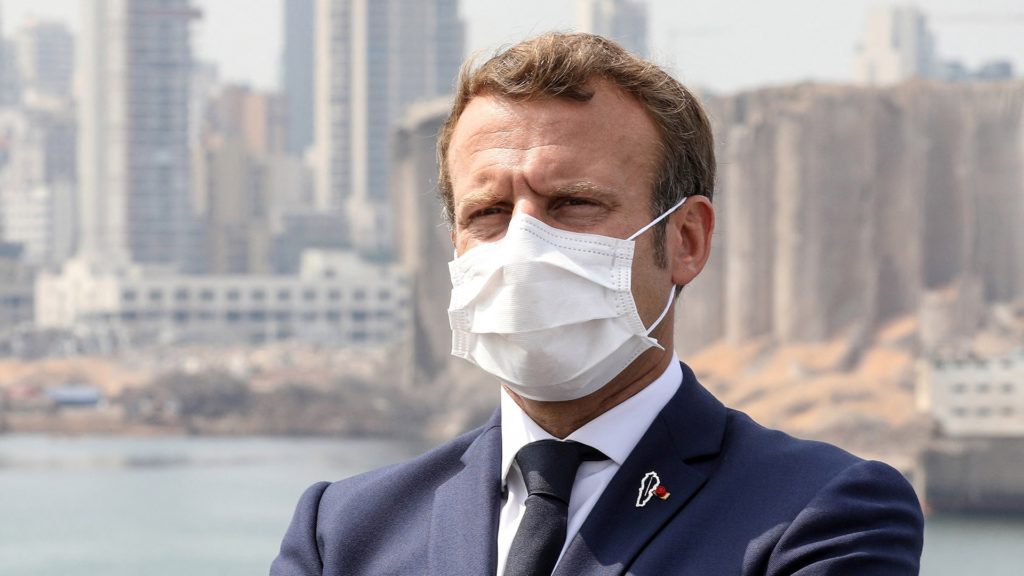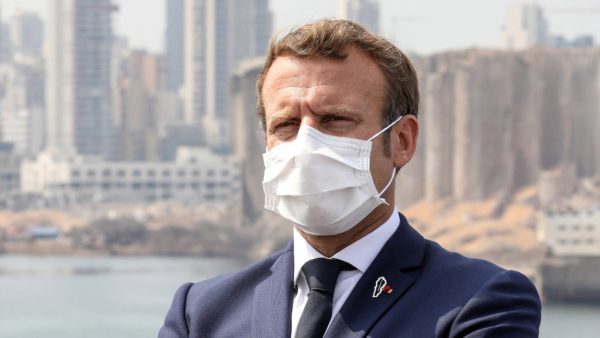French President Emmanuel Macron has now come face to face with the intrigue and venality that brought Lebanon to its knees. He lashed out at Lebanon’s ruling class. But he reserved his most scathing attack for Hezbollah, “Hezbollah can’t be at the same time , an unrestrained militia against civilians in Syria, and a respectable party in Lebanon.” He said

Did anyone really believe that the catastrophic explosion at Beirut’s port in August that devastated large sections of the city would compel Lebanon’s politicians to end their disastrous political stalemate? French President Emmanuel Macron apparently did, as he made it his personal project to help pull Lebanon out of its tragedy. He has now come face to face with the intrigue and venality that brought Lebanon to its knees.
On Sunday, Macron lashed out with barely contained anger at Lebanon’s ruling class. But he reserved his most scathing attack for Hezbollah, the Iran-allied militant group and political party. “Hezbollah can’t be at the same time an army at war with Israel, an unrestrained militia against civilians in Syria, and a respectable party in Lebanon,” Macron told reporters in Paris. In his most withering remark, Macron said the quiet part out loud: “Is [Hezbollah] really a political party, or does it proceed just in a logic dictated by Iran and its terrorist forces?”
Macron’s frustration was triggered by events Saturday, when the prime minister-designate, Mustapha Adib, resigned after failing to form a Cabinet. He had been named to the position less than a month ago with Macron’s backing, in the aftermath of the port explosion. Talks to form a government collapsed when Hezbollah, a dominant party in the Lebanese parliament, along with the other main Shiite party, Amal, refused to relent in their demands to control the powerful Finance Ministry. They also insisted on the power to name all Shiite Cabinet members. Adib refused and resigned.
Adib had taken office following the resignation of Prime Minister Hassan Diab in the days following the blast, which left hundreds dead, thousands injured and caused billions in damage. It lay bare the ineffable cost of Lebanon’s political paralysis and its corrupt, broken political class. Some 2,750 tons of highly explosive ammonium nitrate had been stored for years at the port; senior officials knew but did nothing about it. Diab himself had been in power for only six months, after extended wrangling between Lebanon’s various factions and parties.
But, somehow, Macron thought he could leverage the shock and outrage following the explosion. He has not given up, and he vows to keep pushing. The directness of his language suggests he is willing to break some crockery in the process, but reasons for skepticism about his chances abound.
Of course, Macron’s efforts are not all altruistic. While he has highlighted the cultural and historical links between France and Lebanon, a former French mandate, critics see a new colonial push. Others reasonably detect that geopolitics are, at a minimum, an element of Macron’s approach. He is trying to raise France’s global profile and its influence in the Middle Eastduring a time when the U.S. is in retreat and other powers, notably Russia, Iran and Turkey, are flexing their muscles.
Macron was the first foreign leader to arrive in Beirut after the blast. Wearing a mask because of the coronavirus pandemic, which would take a much greater toll in Lebanon after the explosion, Macron visited the most hard-hit neighborhoods. He was swarmed by angry residents who questioned how he could help without further enriching the people who have been pillaging the country.
“I guarantee you this,” he told them, “aid will not go to corrupt hands.” Sounding somewhere between arrogant and naive, he explained, “I will talk to all political forces and ask them for a new pact.” While Macron was touring the gutted Gemmayzeh neighborhood, Health Minister Hamad Hasan, of Hezbollah, was visiting field hospitals donated by Iran and Russia.
Several weeks later, Macron returned to Beirut. It was Sept. 1, the 100th anniversary of Lebanon’s establishment as a French colonial protectorate after World War I. His visit was filled with symbolism, with the planting of a cedar tree—Lebanon’s national emblem—an overflight of French planes, and meetings with national celebrities, like the singer Fairouz. It was quintessential Macron diplomacy. “The objective of this visit,” he declared, “is clearly to mark the end of a political chapter.”
The plan was to usher Lebanese leaders together and establish something resembling a technocratic government, so that they could at last try to resolve Lebanon’s mounting troubles, instead of just divvying up power and wealth. Lebanon’s woes were already overwhelming well before August. The economy has been spiraling down, steadily destroying the livelihoods of the Lebanese. Anyone who has tried to help the government has walked away in disgust at the refusal of political leaders to set aside their interests for the sake of the nation.
In March, Lebanon defaulted on its loans for the first time in its history. The International Monetary Fund cobbled together a $10 billion rescue package, but talks to disburse it stalled when the IMF demanded reforms from the government. Finance Ministry officials responsible for negotiating with the IMF have been resigning one after the other.
The country’s reserves are quickly running out, inflation is in triple digits, and public services are collapsing. The poverty rate has doubled in the past year, and a majority of the population is now living below the poverty line.
These troubles were not new, but Macron thought the crisis created by the port explosion could open the door to real change. Lebanese politicians for a time appeared to acquiesce. Diab resigned within a week. And the selection of a new prime minister came weeks later, rather than dragging on for months. That was thanks in part to Macron’s personal intervention in securing rare consensus in a country where power is divided along a confessional formula, primarily between Maronite Christians, Sunnis and Shiites, whose vast patronage networks then distribute the spoils to their sects.
Now Macron feels personally betrayed. “I am ashamed of Lebanon,” he admitted this week. “The leaders did not want, clearly and resolutely, to respect the commitment made to France and the international community. They decided to betray this commitment.”
The plan pushed by Macron looks good on paper, with Lebanon’s fractious parties forming a government of competent, qualified people, and in effect, agreeing to save their country. They would engage in reforming a system that was meant to preclude a return to civil war, but instead has entrenched a class of former warlords and their allies. If there was reform, foreign aid would start pouring in. Beirut might again become the Paris of the Middle East.
But it turns out the blast was not strong enough to dislodge the motivations of those serving their own interests at the expense of their country—and Macron has put Hezbollah at the top of that list. “The failure is theirs,” he said pointedly. “I won’t take it on myself. I did the maximum I could.”
Macron has not given up, and many Lebanese still hope he will manage the impossible. But so far, the skeptics have been proven right.
Frida Ghitis is a world affairs columnist. A former CNN producer and correspondent, she is a regular contributor to CNN and The Washington Post.
WORLD POLITICS REVIEW


Leave a Reply
You must be logged in to post a comment.